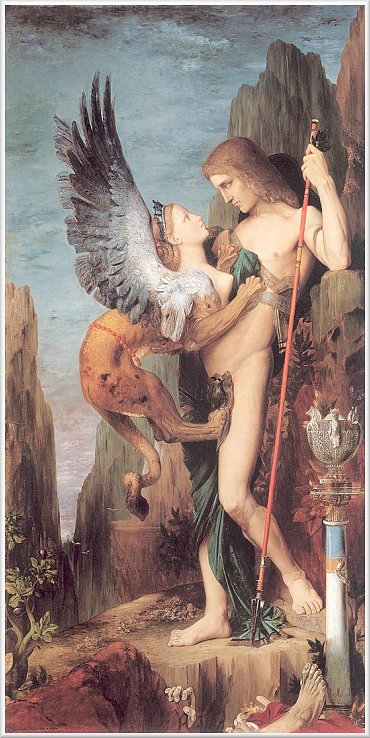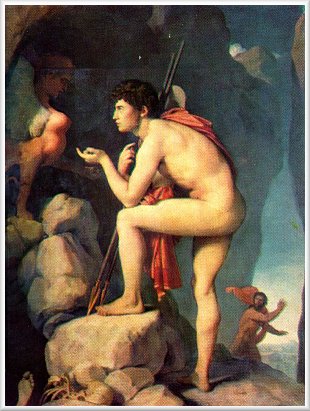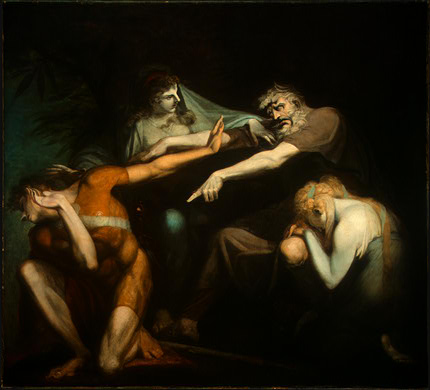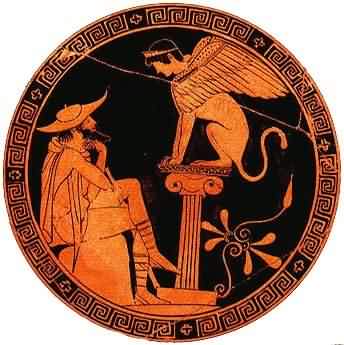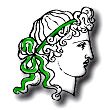|
MYTH MAN'S HOMEWORK HELP CENTER INTRODUCTION "Know Thyself" is sage advice. "All Things in Moderation" is also a wise saying. King Oedipus, subject of the most tragic story ever written, brought about his own downfall because of his excessive obsession to know himself. And, try as he might, the more he tried to escape his tragic Fate, the closer it got... Thus, some say that the moral of the story is, Even if you try to thwart your destiny, you won't succeed. The concept of predestination plays a large role here. For example, if the gods know what will happen, and events are pre-ordained, how can people make free choices or have any semblance of free will? If the gods put challenges in our way that we fail to rise to, are we responsible for the consequences? Would knowing the future, as Oedipus does, cause us to act or behave any differently? The ancient scribe Sophocles wrote "Oedipus the King" (between 441-427 B.C.E.) for the annual festival where playwrights competed for prizes. These festivals were major civic occasions, with attendance expected of all noted writers. In his play Sophocles goes out of his way to present Oedipus as an extremely capable, beloved ruler. It should be noted that Sophocles never suggests that Oedipus has brought his destiny on himself by any "ungodly pride" (hubris) or "tragic flaw" (hamartia), common themes in Greek tragedies. Sophocles also makes a special effort to explain that Oedipus killed King Laius in self-defense, and a major theme in the tragic play is whether one can believe in oracles and seers. The title of the play, from which is derived the story, is often given in its Latin translation ("Oedipus Rex"), rather than in its original Greek ("Oedipus Tyranneus"), since the Greek term for king is the English "tyrant", which means a monarch who rules without the consent of the people. THE TRAGEDY BEGINS Laius and his wife Jocasta (or Iocasta) were King and Queen of Thebes, a prosperous and famous city state in ancient Greece. King Laius, as many people did those days, consulted Apollo's revered oracle of Delphi for advice and to find out what the future held for him. What the oracle announced shocked the royal couple -- The Delphic oracle said that the King's son would grow up and kill him! To make matters worse, it was prophesized that the son would marry his mother and produce offspring by her. King Laius and Queen Jocasta were understandably aghast! A short time later Queen Jocasta became pregnant and gave birth to a darling little baby boy. Remembering with fear the oracle of Delphi's words, the royal couple of Thebes had the infant's feet pierced and tied together -- that's the meaning of the name Oedipus, "swollen feet". (Myth Man's note: this mythical detail makes no sense. It must have been introduced to explain the hero's name. (Hold everything, I stand corrected. Here is an informative note sent by reader Adam Johnston on July 1, 2011.)
Hey there,
Just thought I'd let you know that the 'pointless mythical detail' about Oedipus' feet being pierced and tied together actually has dual function. It was to ensure that the baby would not survive when exposed to the wilderness. But, more importantly, it is a detail that helps him decipher the answer to the sphinx's riddle later in life. He is a crippled man who walks with a cane, and scholars see this as the assistance he needed to understand the part of the riddle regarding the 3 legs. Just thought you should know! ~Adam (Many thanks to Adam for taking time to bring this to my attention.) Laius and Jocasta knew that their baby son had to be destroyed, but they didn't have the heart to do so themselves. They instructed their most trusted slave to expose the hapless baby on Mount Cithaeron, a wild and beast-filled place where the infant surely would perish. In those days, it was usual to leave an unwanted or defective baby in the wilderness. However, the slave glanced down at the innocent child and took pity on it. Knowing that the royal couple of the nearby city state of Corinth was childless, and desperately desired a son, the slave left the crying infant, its feet still pierced and bound by a pin, in a place sure to be found. Sure enough, a kindly shepherd discovered the baby and brought the foundling for adoption to King Polibus and Queen Merope of Corinth. Oedipus was raised as a son by Polibus and Merope and grew to be a handsome, clever and brave young man, even though he walked with a slight limp from the wounds he suffered when his real parents pierced his feet. One day, while playing with his adolescent friends, he got into an argument with them. They insisted, as mean children sometimes do, that he was a fake son, and not the real child of Polibus and Merope. When Oedipus confronted his "parents" about this, they denied that he was adopted and swore that he was their legitimate child. They told Oedipus to forget what the mean kids had said, but now he was intrigued. To discover the truth for himself, Oedipus journeyed to Delphi and asked of the oracle, "Who am I?" The oracle, cryptic as always, replied: "You are the man who will kill his father and breed children by his mother." Confused and devastated, the young man started to head back home. Nearing the crossroad, Oedipus decided never to return to Corinth and go to Thebes instead. He dearly loved his parents and thought that by never returning home he would keep them safe and thus overcome his Fate according to Apollo's oracle. As he was approaching the crossroad between Delphi, Thebes and Corinth, distraught and deep in thought, Oedipus came upon an old man in a chariot, escorted by a few attendants. It was a narrow passage between two rocks and hard to navigate safely. The crabby old man in the chariot shouted: "Get lost! Go away! Get off this road!", striking Oedipus with his long scepter. Adding further injury, the rude, regal old man ran over the young man's sore foot with his chariot wheel. Oedipus angrily grabbed the staff from his tormentor's hands and hit him on the head, killing the old man. The same fate befell the attendants, who tried to attack and arrest Oedipus - he valiantly fought and killed them too, save for one servant, who ran away in panic when the battle broke out. Hey, he just wanted to cross the narrow passage, that's all! Besides, Oedipus was simply defending himself, and he got there first! Little did Oedipus suspect that the old man he had just slain was his own father, and that the first part of the oracle's prophecy had come true... RIDDLE OF THE SPHINX No sooner had he disposed of these bad people, Oedipus came face to face with the Sphinx, sitting on her rock at the crossroad. This creature, a winged lion with the head of a woman, had taken up residence outside of the city of Thebes and was terrorizing the populace. Anybody who passed by the monster was asked this riddle by her: Who in the morning walks on four legs, at midday on two, and in the evening on three?
Her rock and lair was surrounded with a pile of human bones, for the Sphinx ate those who could not answer the riddle. Yet Oedipus was wise and not about to be devoured by a foul-smelling monster. He replied that the answer is Man: Crawling on all fours as a baby; walking on two legs as an adult; and as an old man, leaning on a cane. The riddle was solved and the Sphinx had to throw herself down from the cliff to her doom. The road to Thebes was now free of terror. (Myth Man's note: I've often wondered why the good people of Thebes didn't just shoot the Sphinx with their arrows, killing her, but I guess that would have ruined a good story...Also, why on earth did she not fly away, rather than dropping like a stone to the bottom of the cliff? Oh, well, I suppose the Sphinx had some serious issues...:) Having rid the city of Thebes from this monster with her ridiculous riddle, brave Oedipus was welcomed as a hero by the people (Still, you have to wonder at their intelligence, not being able to figure out the riddle long before Oedipus did...Duh!). The citizens informed him that their king, Laius, just recently was killed in a highway robbery on his way to Delphi, where he had traveled to ask the oracle how best to get rid of the Sphinx. With the death of Laius the Theban throne was left conveniently empty, and the widowed queen Jocasta was still very attractive. The young stranger seemed to be of noble birth, was obviously quite intelligent and probably would make a good king, thought the people of Thebes. The grateful citizens offered Oedipus the throne together with the queen Jocasta, who was not reluctant to marry this young handsome hero. For years Oedipus and Jocasta ruled wisely and lived happily, and their marriage produced four children: the twin brothers, Eteocles & Polyneices, and two girls, Antigone and Ismene. OEDIPUS REX (OEDIPUS THE KING) All was well, till, many years later, a horrific plague suddenly struck the city of Thebes, decimating the populace. Plants, animals, and people were all dying. A huge crowd of people came to the king's palace to beg Oedipus do something and help Thebes, just as he had when he slew the Sphinx. After all, this was why he had been chosen as their king, to save them in times of crisis.
Oedipus was a decent ruler who cared deeply for his people. Unsure of what to do, he sent Creon, brother of Jocosta, to ask the oracle of Delphi as to the cause of the plague, and how to eliminate it. Oedipus told the crowd that Creon was late returning, but as soon as he got back, Oedipus promised to do whatever the oracle said. Just then, Creon arrived. Since he bore good news, he was wearing laurel leaves with berries around his head. Announcing "All's well that ends well", Creon said that Apollo's oracle claimed that the killer of Laius must be found and banished, and then the plague of Thebes would end. Apollo himself had promised that a diligent investigation would reveal the murderer. Oedipus was quite shocked at such negligence, not yet realizing that it was he who unwittingly had slain king Laius, his own father. "How it is possible no investigation of the circumstances of Laius' death was ever carried out?" he asked. "Well," the people explained, "it was a hard time for us all; this monster Sphinx had us terrified, you know...everything happened so suddenly, the king was murdered, and then you appeared in our city and we were busy with your coronation... "There really was no clue as to the perpetrator; just one survivor remained from the massacre and he was out of his wits from fear. Now he is a very old man, you know...When you came to the city, he abruptly left for his hut in the mountains and has never since returned." "Send for him at once!" said Oedipus. Oedipus proceeded to put a formal curse on the murderer of the old king, whoever he was. No citizen anywhere was allowed to give him shelter, food or hospitality. Ironically, Oedipus assured the people that he would do everything within his powers to avenge the death of the old king, just as if the late king were his own father. Further, whoever came forward with information about the murder of Laius would be richly rewarded, and if the killer himself confessed, he would not be punished beyond having to leave the city permanently. On the other hand, if anyone concealed the killer, Oedipus said that he would be cursed and punished. Next, Oedipus decided to consult the famous blind prophet, Teiresias, in hope to find out the divine truth. This respected seer advised Oedipus to forget this matter, to never even try to discover the murderer. "For your own good, don't ask me of anything!" Teiresias beseeched the king. At this, Oedipus became angry and accused Teiresias of being a false prophet, or, worse yet, a conspirator with murderers. It was the old prophet's turn to get angry. Informing Oedipus that he is far too young to speak to him in that fashion, Teiresias told the king that "before the sun is down, you will find out yourself a husband and a son and brother of your children." Hearing the men's shouts, queen Jocasta came out from the palace to find Oedipus bewildered and perplexed. He proceeded to tell his wife about the crazy blind prophet. Jocasta begged her husband to ignore the seer's words, for they were filled with lies. Jocasta then told Oedipus how, in her youth, an oracle had told her and Laius that he would be killed by his own son. She told how the baby son had been left to die in the mountains, and how Laius had been killed by robbers at a crossroad...so much for the oracles, said Jocasta, witness how wrong they could be... Rather than comforting Oedipus, her words began to worry him and to plant some seeds of doubt in his mind. He began asking all sorts of questions from his wife: Where did the murder occur? Which crossroad? How long before he had arrived to Thebes? What did Laius look like? "Tall, a little gray in his hair, and you know something, he looked a lot like you, but older," she replied. With each answer, his mood grew darker. The queen's description evoked the memory of his encounter with the old man in the chariot, whom he had left dead on the crossroad. Could this be Laius? The course of what the ancient poets called peripeteia (turn of events) triggered the mechanisms of anagnorisis (realization). GREEK TRAGEDY! At that crucial moment, a messenger from Corinth arrived with good and bad news: The bad - Oedipus' old father, King Polybus of Corinth, was dead; The good - the city of Corinth expected Oedipus to return and be their king. Oedipus was cautious of the news, hesitant to return to Corinth: He spoke how in his youth the Delphic oracle had warned him that he would kill his father and marry his mother, and that he had decided never to return home, lest somehow the prophecy came true. Oedipus was anxious to go and see his mother while she was still alive, but as long as she lived, he still feared the woeful prophecy. The messenger then dropped the bomb on him -- He informed Oedipus that Queen Merope of Corinth was not his real mother and that he was adopted as a baby. When Oedipus pressed him for details on how he knew this, the messenger replied that he was the one who had delivered him to his royal parents. He had gotten him from some shepherd who had found him wailing, with his feet pierced and bound, way up on Mount Cithaeron. Hearing this, Jocasta turned pale and nearly fainted. She quietly implored Oedipus to cease his investigations regarding his heritage. She now realized everything, including the fact that she had married her own son, and was aghast at the turn of events. Oedipus, on the other hand, suspected that he was the one who killed king Laius, but hadn't yet realized that the victim was his real father. Oedipus was determined to "know thyself" and was eager to unearth the truth regardless of the price. Just then the messenger from Corinth saw the old Shepherd approaching and recognized the man as the one who years ago had given him the baby boy. "Hey, remember me, I'm the one you gave the abandoned baby!" he shouted, but the old shepherd pretended to not recall the incident. He plead forgetfulness and implored Oedipus to let him go. Nothing doing -- the king was determined to learn the truth. Indeed the identity of the baby was established, but the question still remained as to whose baby it was. Pressed for answers, the shepherd finally revealed the fact that the baby was the son of Laius and Jocasta: "And if you are this baby," he said to Oedipus, "then you are definitely the most wretched man who ever lived." Only then came the full anagnorisis (realization) of the tragedy. Not only had Oedipus killed his own father, but he unknowingly had wed his mother and fathered children with her. The oracle's prophecy had come to pass. From the palace emanated cries of anguish and woe -- Queen Jocasta was dying! She had hung herself in the very same bedroom that she had shared with father and son. With superhuman strength, Oedipus broke down her locked door. Rushing into her chambers, Oedipus found her lifeless body. The horror. The horror... Utterly distraught, he grabbed the pin from her dress and poked out his eyes, stabbing them again and again. Following all that his eyes had just seen, and realizing the atrocities he had unwittingly committed, Oedipus felt that he must never again see the light of the sun. The god Apollo gave him the morbid strength to gouge his eyes out of their sockets, according to Oedipus. That's ironic, seeing as it was Apollo's oracles who had practically caused the entire tragedy in the first place, with their horrible prophecy... And so he appeared, blind, at the entrance of the palace (anagnorisis ~ epiphany of the horror) begging to be shown the way to exile (catharsis, cleansing). Thus could the killer plague of Thebes be ended. Oedipus' quest to know himself, and to investigate the death that he must avenge, led to his horrific downfall. Now Oedipus, at long last, knew himself; but the irony was that the knowledge of the self was only achieved by self-destruction. Much as he tried, Oedipus could not out-maneuver his Fate...
DYSFUNCTIONAL FAMILY, OR WHAT... Now blind and truly wretched, Oedipus abandoned the throne of Thebes to Creon, the brother of the late queen, and went into self-imposed exile. His dutiful daughters, Antigone and Ismene, followed him to the end. Staff in hand, Oedipus himself was thus the answer to the riddle of the Sphinx. Athenian king Theseus, the hero who slew the Minotaur, offered refuge to Oedipus and the girls. Oedipus' death is a mystery, and his resting place will protect Athens (see Sophocles, Oedipus in Colonus). His daughters returned to Thebes, and Antigone made preparations to marry Haemon, son of Creon. But a quarrel broke out between Eteocles and Polyneices, the twin sons of Oedipus. Eteocles exiled Polyneices, who then raised an army with seven prominent chieftains against his native Thebes (the famous war of Seven Against Thebes) in an attempt to regain power. The brothers proceeded to kill each other in combat. The tragically empty throne was left to Creon, who became the new king. He ordered a funeral befitting a hero for Eteocles, defender of the city, while leaving the body of Polyneices out in the open air, forbidding anyone to bury him under severe punishment. Antigone, the sister of the deceased, could not bear to see her brother's corpse so dishonored and she secretly performed his funeral rites. King Creon, shocked by the disobedience of this young girl, his own niece and daughter-in-law-to-be, locked her in a cave to die, despite the strenuous entreaties and protests of his son Haemon, Antigone's beloved fiancée. Warned by divine omens and the old prophet Teiresias, the king finally relented and ordered the cave to be opened. Alas, it was far too late, for Antigone had hanged herself with her girl's belt. Could things get any more tragic? Yes indeed...Haemon, having found his bride dead, cursed his father, spat in his face and then killed himself in his presence. (Death of the lovers in or near a tomb - shades of Pyramus and Thisbe in Ovid, and Romeo and Juliet in Shakespeare.) Hearing these news, Creon's wife also killed herself, cursing her husband. So, Creon turned out to be as big an all-around loser as poor Oedipus. What a tragedy! It's enough to give you a complex...
For more on the Sphinx, go here
|
